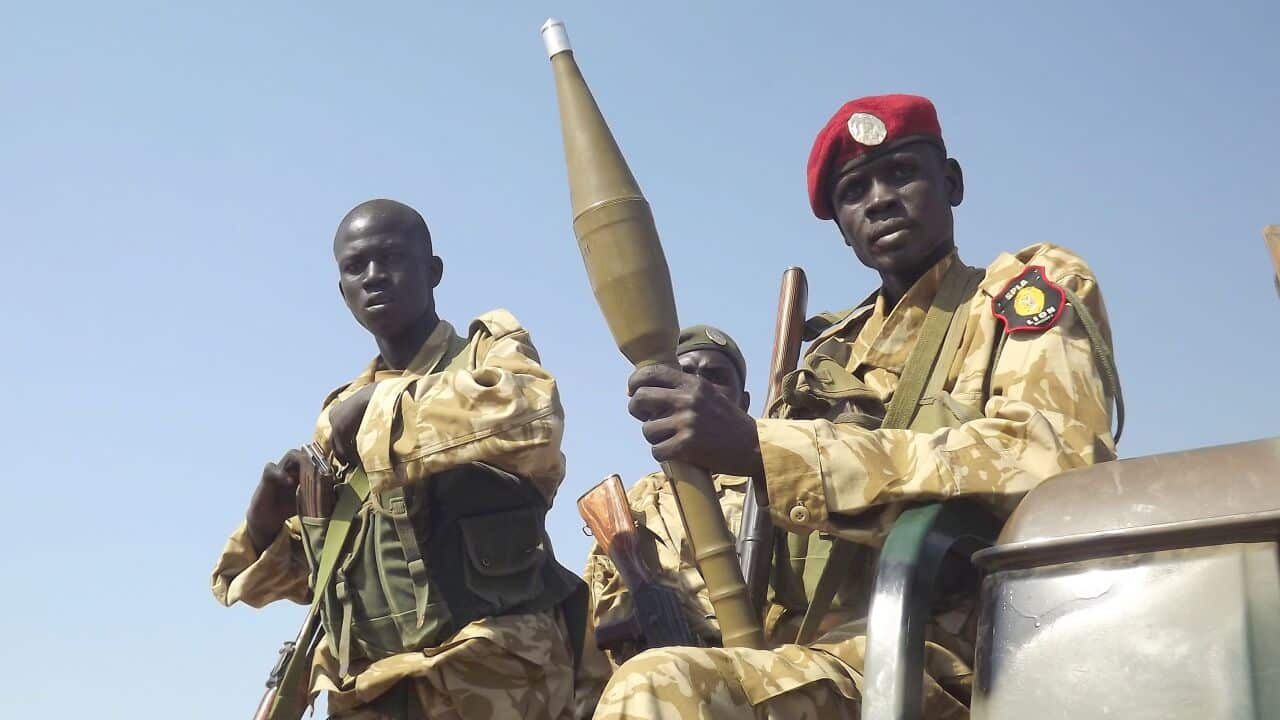(Transcript from World News Australia Radio)
The United Nations has again appealed for peace in South Sudan and says it's expecting reinforcements to arrive in the next two days.
As fighting continues between government and rebel forces, African leaders are attempting to mediate between President Salva Kiir and his rivals.
Hannah Sinclair has more.
(Click on audio tab to listen to this item)
The United Nations Security Council says it is hurrying to deploy 12,500 soldiers to its peacekeeping force in South Sudan.
More than a week of fighting between troops loyal to President Salva Kiir and those backing former vice-president Riek Machar has reportedly left several thousand people dead.
Tens-of-thousands have also been displaced by the conflict and are seeking refuge in UN camps.
The Head of the UN mission, Hilde Johnson has appealed for leaders to put an end to the violence.
"These past 11 days have been a very trying time for South Sudan and for all citizens of this newborn nation. What has happened this last week has for many of them brought back the nightmares of the past. The nation that was painstakingly built over decades of conflict and strife is at stake."
Regional leaders say dialogue is the best way to end the crisis and they are calling for a cessation of hostilities.
Mr Kiir met with the Ethiopian Prime Minister Hailemariam Desalegn and Kenyan President Uhuru Kenyatta in Juba on Thursday.
Ethiopian Foreign Minister Tedros Adhanom says the talks were positive and focused on a civil solution.
"Leaders also have underlined that the unconstitutional means to remove democratically elected government should be condemned and any solution to this crisis should be through political dialogue and the IGAD (The Intergovernmental Authority on Development) countries and the two leaders who were here will do their best to resolve this problem amicably."
Australia will provide two military aircraft to help the peacekeeping efforts in South Sudan.
Acting Prime Minister Warren Truss has told the ABC that Australia is awaiting instructions from the UN before sending the aircraft.
"We're on standby and the aircraft are in the United Arab Emirates at the present time. And once we've got indications of the tasks we'll make new assessments of the risks to ensure that our equipment is suitable to undertake the tasks before we position them in Africa."
The Foreign Minister Julie Bishop says the planes may also be used to assist those Australian citizens in need of evacuation.
"I understand that several hundred Australians have been evacuated, they have left. They've found their own way; there are commercial options available. But in the event that commercial options are not available, then we will assist, evacuate anyone who has not already left the country.
Both President Salva Kiir and his former deputy Riek Machar say their dispute is political, not tribal.
But many of the 45,000 civilians seeking refuge inside UN bases across the country report they have been targeted based on their ethnicity.
Africa's youngest nation is home to 10.8 million people who many claim are now being split along ethnic lines of Nuer and Dinka.
Former Vice-President Machar, a Nuer who was sacked in July, says talks can only take place once those detained from his group are released-- a condition President Kiir, an ethnic Dinka, has not yet been able to meet.
The UN's Special Representative to South Sudan, Hilde Johnson says the political deadlock will see the peacekeeping mission continue for some time.
"We are improving an increased and rapid re-deployment of available mission assets to the most volatile areas and, in particular, where civilians have sought refuge in our camps. We are now at over 50,000 civilians in our various compounds in Juba, Bor, Bentiu, Malakal and elsewhere. And their presence is an eloquent testimony to the acute need for enhanced UN operations in South Sudan. Therefore, we are not abandoning South Sudan. We are here to stay and we are here to protect."

